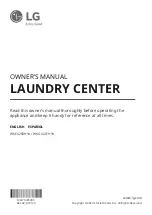
3
Risk of fire!
■
Never store combustible items in the cooking compartment.
Never open the appliance door if there is smoke inside.
Switch off the appliance. Pull out the mains plug or switch off
the circuit breaker in the fuse box.
■
Do not place greaseproof paper loosely over accessories
during preheating. A draught is created when the appliance
door is opened. The greaseproof paper may come into
contact with the heating element and catch fire. Always
weight down the greaseproof paper with a dish or a baking
tin. Only cover the surface required with greaseproof paper.
The greaseproof paper must not protrude over the
accessories.
Risk of short circuit!
Never trap connecting cables of electrical appliances in the hot
appliance door. The cable insulation could melt.
Risk of scalding!
Never pour water into the hot cooking compartment. This will
produce hot steam.
Hot accessories and ovenware
Risk of burns!
Never remove ovenware or accessories from the cooking
compartment without an oven cloth or oven gloves.
Improper repairs
Risk of electric shock!
Improper repairs are dangerous. Repairs may only be carried
out by one of our trained after-sales engineers. If the appliance
is defective, pull out the mains plug or switch off the appliance
at the circuit breaker in the fuse box. Call the after
sales
service.
Causes of damage
Caution!
■
Accessories, foil, greaseproof paper or ovenware on the
cooking compartment floor: do not place accessories on the
cooking compartment floor. Do not cover the cooking
compartment floor with any sort of foil or greaseproof paper.
Do not place ovenware on the cooking compartment floor if a
temperature of over 50 ºC has been set. This will cause heat
to accumulate. The baking and roasting times will no longer
be correct and the enamel will be damaged.
■
Water in a hot cooking compartment: do not pour water into
the cooking compartment when it is hot. This will cause
steam. The temperature change can cause damage to the
enamel.
■
Moist food: do not store moist food in the cooking
compartment when it is closed for prolonged periods This will
damage the enamel.
■
Fruit juice: when baking particularly juicy fruit pies, do not
pack the baking tray too generously. Fruit juice dripping from
the baking tray leaves stains that cannot be removed. If
possible, use the deeper universal pan.
■
Cooling with the appliance door open: only allow the cooking
compartment to cool when it is closed. Even if the appliance
door is only open a little, front panels of adjacent units could
be damaged over time.
■
Heavily soiled oven seal: if the oven seal is heavily soiled, the
oven door will no longer close properly when the oven is in
operation. The fronts of adjacent units could be damaged.
Always keep the oven seal clean.
■
Oven door as a bearing surface: do not stand or place
objects on the oven door when it is open. Do not place
ovenware or accessories on the oven door.
■
Carrying the appliance: do not carry or hold the appliance by
the door handle. The door handle cannot support the weight
of the appliance and could break.
Energy and environment tips
Here you can find tips on how to save energy when baking and
roasting and how to dispose of your appliance properly.
Saving energy
Only preheat the oven if this is specified in the recipe or in the
operating instruction tables.
Use dark, black lacquered or enamelled baking tins. They
absorb the heat particularly well.
Open the appliance door as little as possible during cooking,
baking or roasting.
It is best to bake several cakes one after the other. The cooking
compartment is still warm. This may reduce the baking time for
the second cake.
For longer cooking times, you can switch the oven off
10 minutes before the end of the cooking time and use the
residual heat to finish cooking.
Environmentally-friendly disposal
Dispose of packaging in an environmentally-friendly manner.
Your new appliance
In this section, you will find information on
■
the control panel
■
the operating modes
■
the shelf positions
■
accessories
This appliance complies with European Directive
2002/96/EC on Waste Electrical and Electronic
Equipment (WEEE). The directive gives a framework for
the collection and recycling of old appliances, which is
valid across the EU.
Summary of Contents for B45M42NOGB
Page 1: ......
Page 2: ......
Page 3: ......
Page 4: ......
Page 5: ......
Page 6: ......
Page 7: ......
Page 8: ......
Page 9: ......
Page 10: ......
Page 11: ......
Page 12: ......
Page 13: ......
Page 14: ......
Page 15: ......
Page 16: ......
Page 17: ......
Page 18: ......
Page 19: ......
Page 20: ......




































